- Clone
- 11F8 (See other available formats)
- Regulatory Status
- RUO
- Other Names
- Toll like receptor 3
- Isotype
- Rat IgG2a
- Ave. Rating
- Submit a Review
- Product Citations
- publications
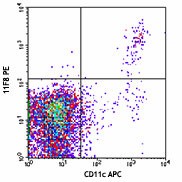
-

C57BL/6 mouse splenocytes were surface stained with CD4/CD19/Ly-6G/NK1.1 PerCP, CD11c APC and CD8 FITC, followed by intracellular staining with TLR3 (clone 11F8) PE (top) or rat IgG2a, κ PE isotype control (bottom). The data was analyzed by gating on CD4/CD19/Ly-6G/NK1.1 negative and CD8 positive cells. -

| Cat # | Size | Price | Quantity Check Availability | Save | ||
|---|---|---|---|---|---|---|
| 141903 | 25 µg | 142€ | ||||
| 141904 | 100 µg | 288€ | ||||
Toll-like receptor 3 (TLR3), also known as CD283, is type I transmembrane protein that belongs to the TLR family. It forms a large horseshoe shape that contacts a neighboring horseshoe, forming a dimer of two horseshoes. It is characterized by an extracellular domain with leucine-rich repeats and a cytoplasmic domain with homology to the type I IL-1 receptor. TLR3 is expressed selectively on the cytoplasmic membrane and intracellularly in dendritic cells. It is also highly expressed in the placenta, pancreas, heart, liver, lung, and muscle. TLR3 is a pattern recognition receptor that participates in innate immune response to microbial pathogens by recognizing polyinosine-polycytidylic acid (Poly(I:C)) and dsRNA. Ligand binding by TLR3 induces receptor dimerization which results in inducing NF-κB activation (via TRIF-linked RIP1/TLR3 interactions) and cytokine production. TLR3 has been shown to interact with a number of proteins including MYD88, TRAF6, TRIAD3, MAP3K7, and TAB2.
Product DetailsProduct Details
- Verified Reactivity
- Mouse
- Antibody Type
- Monoclonal
- Host Species
- Rat
- Immunogen
- Recombinant mouse TLR3 extracellular domain.
- Formulation
- Phosphate-buffered solution, pH 7.2, containing 0.09% sodium azide.
- Preparation
- The antibody was purified by affinity chromatography and conjugated with PE under optimal conditions.
- Concentration
- 0.2 mg/ml
- Storage & Handling
- The antibody solution should be stored undiluted between 2°C and 8°C, and protected from prolonged exposure to light. Do not freeze.
- Application
-
ICFC - Quality tested
- Recommended Usage
-
Each lot of this antibody is quality control tested by intracellular immunofluorescent staining with flow cytometric analysis. For flow cytometric staining, the suggested use of this reagent is ≤0.125 µg per million cells in 100 µl volume. It is recommended that the reagent be titrated for optimal performance for each application.
- Excitation Laser
-
Blue Laser (488 nm)
Green Laser (532 nm)/Yellow-Green Laser (561 nm)
- Application Notes
-
Additional reported application (for the relevant formats) include: immunohistochemical staining of frozen tissue1.
-
Application References
(PubMed link indicates BioLegend citation) -
- McCartney S, et al. 2009. J. Exp. Med. 13:2967. (IHC)
- Product Citations
-
- RRID
-
AB_10895749 (BioLegend Cat. No. 141903)
AB_10895749 (BioLegend Cat. No. 141904)
Antigen Details
- Structure
- Toll-like receptor family member; type I membrane protein containing multiple leucine repeats and a interleukin-1 receptor like region in the extracellular domain. Predicted molecular weight approximately 116 kD.
- Distribution
- Selective expression in dendritic cells. Highly expressed in placenta and the pancreas; also expressed in heart, liver, lung and muscle.
- Function
- Pattern recognition receptor that participates in innate immune response to microbial pathogens. TLR3 ligands induce NF-κB (via TRIF-linked RIP1/TLR3 interactions) and cytokine production. TLR3 stimulation results in the production of cytokines.
- Interaction
- MYD88, TRAF6, TRIAD3, MAP3K7, and TAB2.
- Ligand/Receptor
- Polyinosine-polycytidylic acid (Poly(I:C)), dsRNA.
- Cell Type
- Dendritic cells
- Biology Area
- Cell Biology, Immunology, Innate Immunity, Signal Transduction
- Molecular Family
- CD Molecules, Toll Like Receptors
- Antigen References
-
1. Alexopoulou L, et al. 2001. Nature 413:732.
2. Doyle SE, et al. 2002. Immunity 17:251.
3. Meylan E, et al. 2004. Nat Immunol. 5:503.
4. Muzio M, et al. 2000. J. Immunol. 164:5998.
5. Rock FL, et al. 1998. P. Natl. Acad. Sci. USA 95:588. - Gene ID
- 142980 View all products for this Gene ID
- UniProt
- View information about CD283 on UniProt.org
Related FAQs
- What type of PE do you use in your conjugates?
- We use R-PE in our conjugates.
Other Formats
View All CD283 Reagents Request Custom Conjugation| Description | Clone | Applications |
|---|---|---|
| PE anti-mouse CD283 (TLR3) | 11F8 | ICFC |
| APC anti-mouse CD283 (TLR3) | 11F8 | ICFC |
Customers Also Purchased
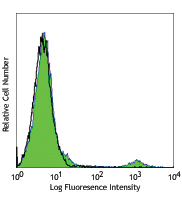
Compare Data Across All Formats
This data display is provided for general comparisons between formats.
Your actual data may vary due to variations in samples, target cells, instruments and their settings, staining conditions, and other factors.
If you need assistance with selecting the best format contact our expert technical support team.
-
PE anti-mouse CD283 (TLR3)
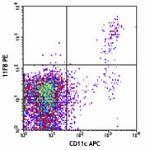
C57BL/6 mouse splenocytes were surface stained with CD4/CD19... 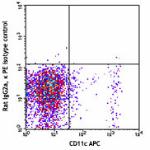
-
APC anti-mouse CD283 (TLR3)
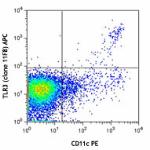
C57BL/6 mouse splenocytes were surface stained with CD4/CD19... 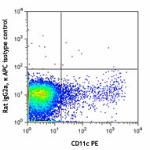

 Login / Register
Login / Register 










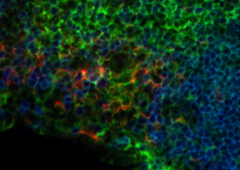

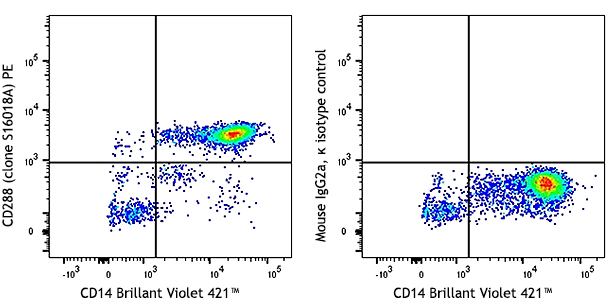



Follow Us